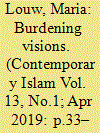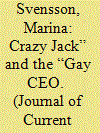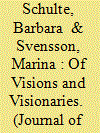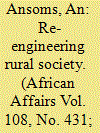|
|
|
Sort Order |
|
|
|
Items / Page
|
|
|
|
|
|
|
| Srl | Item |
| 1 |
ID:
164021


|
|
|
|
|
| Summary/Abstract |
Taking an ethnographic point of departure in the relationship between two women in Bishkek, the capital of Kyrgyzstan – a doctor and a clairvoyant – the article will focus on the ambiguous ways the visible and the invisible intersect in the lives of the Kyrgyz. Esoteric experiences such as ayan, dream omens, sometimes stand out as flashes of insight which bring clarity and guidance, but are equally often unwanted disturbances which haunt people against their will. In order to do justice to this ambiguity I engage the phenomenology of the alien as developed by Bernhard Waldenfels, arguing that esoteric experiences may be seen as an example of what he terms radical alienness which cast doubt on interpretation itself.
|
|
|
|
|
|
|
|
|
|
|
|
|
|
|
|
| 2 |
ID:
178315


|
|
|
|
|
| Summary/Abstract |
This article analyses the visions, careers, and companies of Jack Ma of Alibaba and Geng Le of Blue City. Jack Ma is a well-known business leader and visionary, whereas the less well-known Geng Le only began to receive more attention since launching a successful gay dating app in 2012. The article focuses on the personal narratives and visions of these two IT entrepreneurs. It provides new perspectives on the role of individual entrepreneurs in relation to the Chinese state’s global ambitions and vision of creating a “strong internet country.” It argues that the commercialisation and platformisation of the Chinese internet, and the growing transnational nature of Chinese IT companies, serve to make them more, not less, co-dependent of the state and its visions. The internet’s emancipatory potential is today increasingly conflated with consumption, and online spaces and social relations are subject to both commodification and datafication.
|
|
|
|
|
|
|
|
|
|
|
|
|
|
|
|
| 3 |
ID:
178311


|
|
|
|
|
| Summary/Abstract |
This special issue approaches information and communication technologies (ICT) visions and their realisation/implementation at various levels, among different actors and from various perspectives. Conceptually, we distinguish three different dimensions, even though those overlap in the individual contributions as well as in empirical reality – namely ideational, instrumental, and relational. The different contributions address both visions formulated by the Chinese state and by individual actors such as entrepreneurs. Even though the conditions for the use of ICT in China are deeply affected by state governance, this governance is in no way tantamount to one single government. As this issue’s contributions show, state attempts at building a stable cyber-governance are in need of allies and, depending on the allies’ visions and other, competitive visions, the outcomes of these dynamics are seldom truthful realisations of one original grand masterplan.
|
|
|
|
|
|
|
|
|
|
|
|
|
|
|
|
| 4 |
ID:
087723


|
|
|
|
|
| Publication |
2009.
|
| Summary/Abstract |
This article analyses the Rwandan elite's visions and ambitions for a wide-ranging re-engineering of rural society. The post-1994 political elite has few links to rural society and the peasant way of life, and sees little room for small-scale peasant agriculture in Rwanda's economic future. The article shows how current Rwandan policy makers aim to realize three social engineering ambitions: first, to transform the agricultural sector into a professionalized motor for economic growth, centred on competitive and commercial farm units; second, to artificially upgrade rural life by inserting 'modern' techniques and strategies into local realities, while hiding true poverty and inequality; and, finally, to transform Rwanda into a target-driven society from the highest to the lowest level. The article points to the (potential) dangers, flaws, and shortcomings of this rural re-engineering mission, and illustrates how the state as the engineer 'hovers' above the local without consulting those affected. It concludes that contemporary polices are unlikely to be conducive to poverty reduction.
|
|
|
|
|
|
|
|
|
|
|
|
|
|
|
|
| 5 |
ID:
110728


|
|
|
|
|
| Publication |
2011.
|
| Summary/Abstract |
Many decisions about future energy systems in small communities are based on the visions of several key actors about the ideal-type system. Although meaningful, such visions may not inclusively represent the objectives of all relevant actors. Moreover, the visions are mostly intuitively judged by these actors and reflect their experiences and concerns. Yet, analytical expertise provides essential information about the required decisions and their consequences. We argue that coming up with a number of alternative visions about a future energy system and addressing these visions from both intuitive and analytical perspectives leads to better-quality decisions. This paper presents a case study in the small Swiss community of Urnäsch, where actors from practice and academia collaborated in a transdisciplinary process to address the future energy system. Visions of these actors about the ideal-type energy system were linked both with energy scenarios that analytically specified options to implement these visions and with stakeholder-based multi-criteria assessment of the consequences. As a result, most of the involved actors adjusted their initial vision preferences. Thus, we believe this approach could lead to capacity building and formation of stable, informed preferences, which are necessary to support a transition in the coming decades.
|
|
|
|
|
|
|
|
|
|
|
|
|
|
|
|
| 6 |
ID:
164020


|
|
|
|
|
| Summary/Abstract |
During the Egyptian uprising in 2011, a TV crew accidentally filmed a ghostly horseman in the midst of protesters. This essay takes the ghostly horseman as a starting point for thinking about the possibilities of an anthropology of al-ghayb, the invisible and unknown. Drawing on fieldwork in Egypt, as well as online reports and contestations of apparitions, visions, and dreams seen during the uprising, I suggest that accounts of the unseen pose a profound challenge to (and open up new possibilities for) doing ethnographic research, writing ethnography, and thinking anthropologically. Inspired by Michael Taussig, I suggest that the challenge is not to undo the invisible but to find a language that runs along the seam where the visible and the invisible connect and disconnect.
|
|
|
|
|
|
|
|
|
|
|
|
|
|
|
|
| 7 |
ID:
178313


|
|
|
|
|
| Summary/Abstract |
This study seeks to explain how Chinese state media bolster the use of visions in global internet governance. The empirical data for the article consist of 1,158 internet-related articles published in the Global Times between 2009 and 2018. I develop a theoretical perspective that distinguishes between grand and strategic narratives. Based on a mixed-methods approach, I show that “internet sovereignty” has qualified as a grand narrative since the second half of 2013. State media facilitate this shift with strategic narratives that push the content and context of “internet sovereignty” from domestic political rationales towards a matter of global affairs. The article contributes to theoretical and methodological advancement in textual analysis.
|
|
|
|
|
|
|
|
|
|
|
|
|
|
|
|
|
|
|
|
|